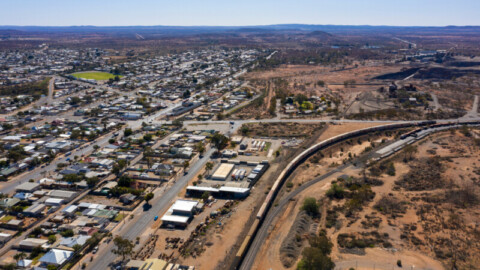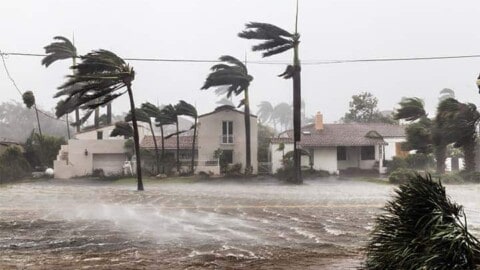Flood warnings are set to continue in parts of New South Wales, as heavy rainfall devastates metropolitan and Western Sydney, Illawarra, and the Central Tablelands districts.
For many regions, this is the third or fourth time in 18 months a major weather event has led to flooding, evacuation and extensive damage.
Widespread persistent heavy rain developed in late June along the central New South Wales coast and is forecasted to continue until 6 July or later as a coastal trough develops and then deepens along the coast.
The timing, amount and location of wind, rainfall and riverine flooding impacts will be driven by the evolution of this weather system, with a degree of uncertainty remaining.
There will be further updates to forecasts and warnings over coming days.
Major flooding is occurring along the Hawkesbury and Nepean rivers at Menangle, Wallacia and North Richmond with major flooding expected at Windsor and Lower Portland and Wiseman Ferry on 5 July.
With significant rainfall totals over many catchments, some areas are expected to approach or exceed flood levels of recent events in March 2021, March 2022 and April 2022.
Severe weather warnings for damaging winds and hazardous surf are current for New South Wales and there remains the risk of flash flooding and landslips.
Funding available to natural disaster declared communities
Disaster assistance is now available in 23 local government areas (LGAs) following severe storms and flooding from 27 June 2022, which continue to impact large areas of Sydney and the New South Wales coast.
The LGAs are Blacktown, Blue Mountains, Camden, Canterbury Bankstown, Campbelltown, Central Coast, Cessnock, Fairfield, Georges River, Hawkesbury, Hornsby, Kiama, Lithgow, Liverpool, Northern Beaches, Penrith, Shellharbour, Shoalhaven, Sutherland, The Hills, Wingecarribee, Wollondilly and Wollongong.
Assistance is being provided through the jointly funded Commonwealth-State Disaster Recovery Funding Arrangements (DRFA).
Federal Minister for Emergency Management, Senator Murray Watt, said the flooding has led to a large number of evacuations throughout Metropolitan Sydney, the Hawkesbury and the Central Coast, with major flood operations still ongoing.
“We have seen some of these impacted communities being hit by floods for a third and fourth time in 18 months, which is extremely distressing to the residents of these communities,” Mr Watt said.
“The Australian and New South Wales governments have worked very cooperatively through this latest flood emergency, to ensure defence and other resources were deployed early and fast.
“Similarly, we’re now working hard together to make sure that impacted communities get the financial and other assistance they need as soon as possible.”
New South Wales Minister for Emergency Services and Resilience and Minister for Flood Recovery, Steph Cooke, said significant recovery support would be required to help support communities once the major weather event passes.
“This announcement will ensure immediate assistance is available to impacted communities, including assistance for people who have lost or had damage to their homes,” Ms Cooke said.
“While we are still very much in the emergency response phase of this developing weather event, as waters recede we will work with communities to assess longer term recovery needs and ensure appropriate long-term support is provided.”
Assistance available under the DRFA may include:
- Help for eligible people whose homes or belongings have been damaged (eligibility criteria apply)
- Support for affected local councils to help with the costs of cleaning up and restoring damaged road and essential public assets
- Concessional interest rate loans for small businesses, primary producers and non-profit organisations
- Freight subsidies for primary producers
To apply for a concessional loan or primary producer grant, contact the New South Wales Rural Assistance Authority on 1800 678 593 or visit its website here.
Information on disaster assistance can be found on the National Recovery and Resilience Agency’s website here.
Agriculture and animal emergency flood hotline reactivated
Landholders impacted by the current flood event across New South Wales can now access immediate support through the reactivated Agriculture and Animal Emergency Services hotline on 1800 814 647.
New South Wales Minister for Agriculture, Dugald Saunders, said significant work has already been undertaken as part of the flood emergency response to provide support to communities as quickly as possible.
“The New South Wales Government put plans and processes in place in anticipation of this flood emergency to ensure we were ready to respond and provide immediate support to primary producers, landholders and the broader community,” Mr Saunders said.
“Although the full extent of the damage across the State is varied and yet to be realised, we are providing emergency support to landholders, including providing emergency fodder, animal assessments and welfare checks, and emergency safe places for livestock and domestic animals.
“As the flooding continues to unfold in the coming days, the staff on the ground and in the response centres will adapt as required to provide the necessary support for local landholders and community members.
“The Department of Primary Industries and Local Land Services are working together to assist landholders and communities with animal welfare and agriculture related issues arising from the current flood event devastating New South Wales.”
New South Wales Minister for Emergency Services and Resilience and Minister for Flood Recovery, Steph Cooke, said an animal-safe space at Castle Hill is now open to temporarily house livestock and domestic animals, with the potential for more sites to operate in the coming days.
“With further heavy rainfall forecast, landholders and community members are urged to move their livestock and domestic animals to higher ground and consider evacuating animals, where safe to do so,” Ms Cooke.
“With many properties impacted by flooding this hotline will help landholders manage their livestock and animals and keep them safe as this flooding continues.”












